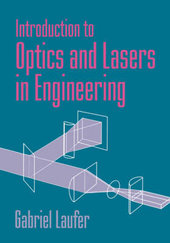
|
Introduction to Optics and Lasers in Engineering
Paperback / softback
Main Details
| Title |
Introduction to Optics and Lasers in Engineering
|
| Authors and Contributors |
By (author) Gabriel Laufer
|
| Physical Properties |
| Format:Paperback / softback | | Pages:500 | | Dimensions(mm): Height 254,Width 177 |
|
| Category/Genre | Mechanical engineering |
|---|
| ISBN/Barcode |
9780521017626
|
| Classifications | Dewey:621.366 |
|---|
| Audience | | Professional & Vocational | |
|---|
| Illustrations |
12 Tables, unspecified; 1 Halftones, unspecified; 180 Line drawings, unspecified
|
|
Publishing Details |
| Publisher |
Cambridge University Press
|
| Imprint |
Cambridge University Press
|
| Publication Date |
29 September 2005 |
| Publication Country |
United Kingdom
|
Description
In a very short time, lasers have advanced from research interest to increasingly useful, commercially available tools for material processing, precision measurements, surgery, communication, and even entertainment. This book provides the background in theoretical physics necessary to understand engineering applications. It summarises relevant theories of geometrical optics, physical optics, quantum optics, and laser physics and ties them to applications in such areas as fluid mechanics, combustion, surface analysis, material processing and laser machining. Advanced topics such as laser Doppler velocimetry, laser-induced fluorescence, and holography are clearly and thoroughly explained. The book includes numerous examples and homework problems. A unique feature is the advanced research problems in each chapter that simulate real-world research and encourage independent reading and analysis.
Reviews'The material is presented in a logical sequence of gradually increasing complexity ... there are two sets of problems given at the end of each chapter, the first of which ('homework problems') should be soluble from a reading of the text alone, whilst the second set ('research problems') requires the student to obtain and independently read original papers describing material not discussed in the book. This book should therefore provide an excellent graduate-level introduction to the principles and applications of optics in modern-day engineering practice.' Professor M. J. Adams, The Aeronautical Journal
|